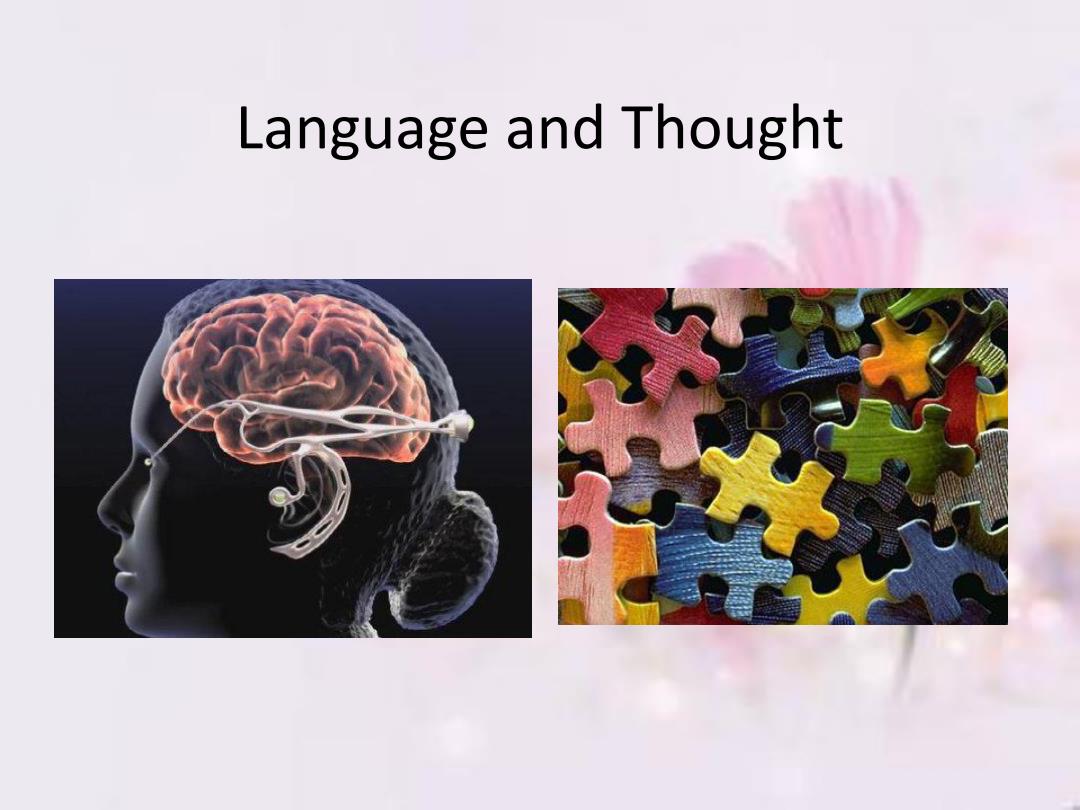
Language and Thought
Language and Thought
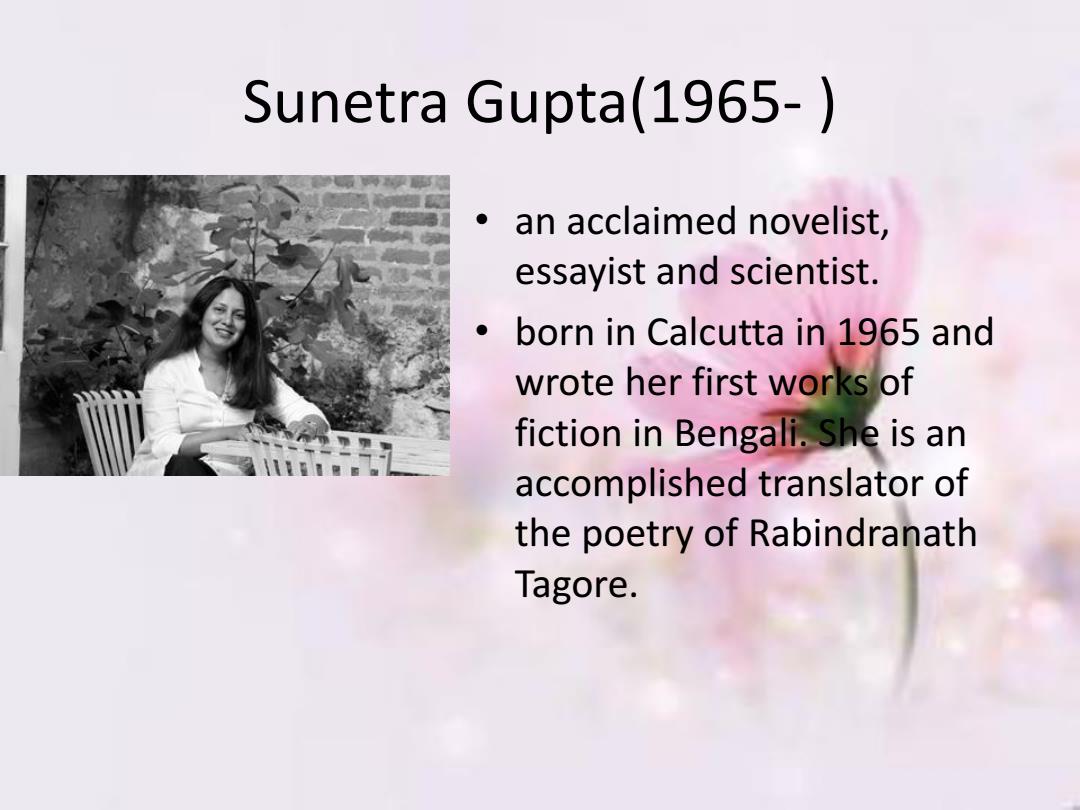
Sunetra Gupta(1965-) an acclaimed novelist, essayist and scientist. born in Calcutta in 1965 and wrote her first works of fiction in Bengali.She is an accomplished translator of the poetry of Rabindranath Tagore
Sunetra Gupta(1965- ) • an acclaimed novelist, essayist and scientist. • born in Calcutta in 1965 and wrote her first works of fiction in Bengali. She is an accomplished translator of the poetry of Rabindranath Tagore

● Sunetra's childhood and her family's peripatetic (wandering,going from place to place)lifestyle have had a great impact on her work.Her early years were spent moving between Ethiopia,Zambia and England.When she was 11 the family returned to Calcutta,a city which continues to inspire her writing
• Sunetra's childhood and her family's peripatetic (wandering, going from place to place) lifestyle have had a great impact on her work. Her early years were spent moving between Ethiopia, Zambia and England. When she was 11 the family returned to Calcutta, a city which continues to inspire her writing
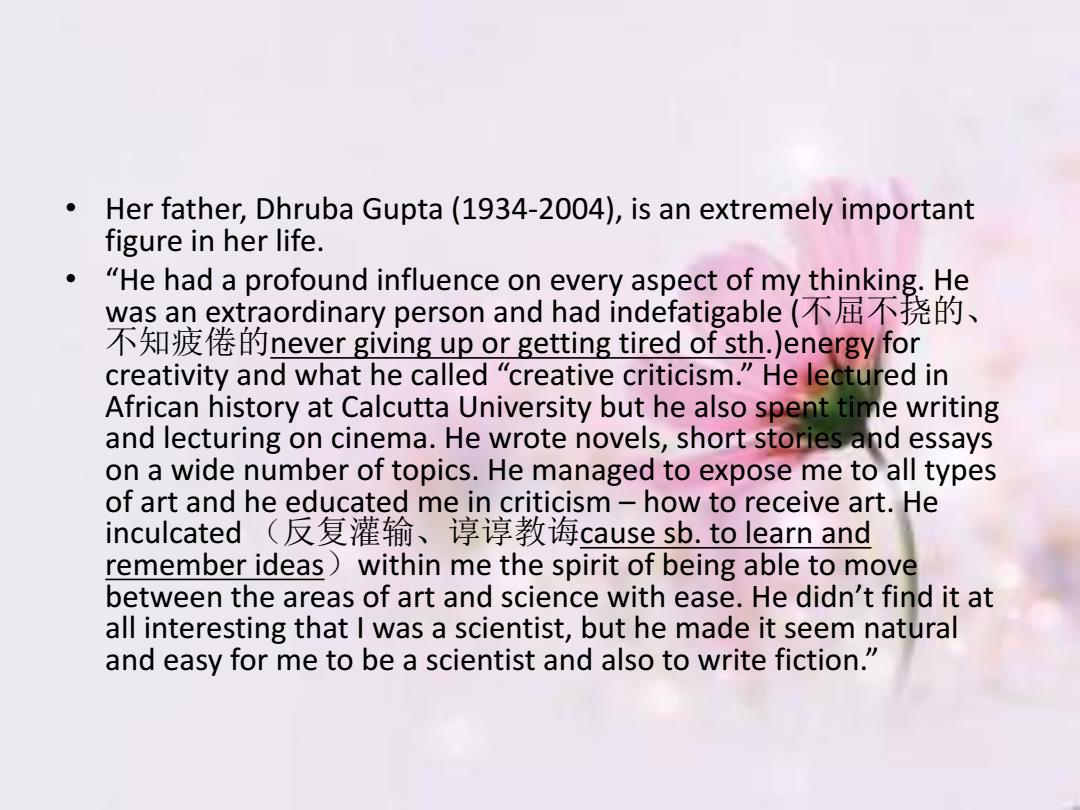
Her father,Dhruba Gupta(1934-2004),is an extremely important figure in her life. "He had a profound influence on every aspect of my thinking.He was an extraordinary person and had indefatigable(不屈不挠的、 不知疲倦的never giving up or getting tired of sth.)energy for creativity and what he called "creative criticism."He lectured in African history at Calcutta University but he also spent time writing and lecturing on cinema.He wrote novels,short stories and essays on a wide number of topics.He managed to expose me to all types of art and he educated me in criticism-how to receive art.He inculcated(反复灌输、谆谆教诲cause sb.to learn and remember ideas)within me the spirit of being able to move between the areas of art and science with ease.He didn't find it at all interesting that I was a scientist,but he made it seem natural and easy for me to be a scientist and also to write fiction
• Her father, Dhruba Gupta (1934-2004), is an extremely important figure in her life. • “He had a profound influence on every aspect of my thinking. He was an extraordinary person and had indefatigable (不屈不挠的、 不知疲倦的never giving up or getting tired of sth.)energy for creativity and what he called “creative criticism.” He lectured in African history at Calcutta University but he also spent time writing and lecturing on cinema. He wrote novels, short stories and essays on a wide number of topics. He managed to expose me to all types of art and he educated me in criticism – how to receive art. He inculcated (反复灌输、谆谆教诲cause sb. to learn and remember ideas)within me the spirit of being able to move between the areas of art and science with ease. He didn’t find it at all interesting that I was a scientist, but he made it seem natural and easy for me to be a scientist and also to write fiction

"My father loved to travel which is why,during my childhood,he insisted on taking teaching jobs in Ethiopia,Zambia and Britain which brought much excitement into our lives,but not much security.My father was a very principled man and would easily resign a position without any regard as to how it might imperil him financially. My mother was never very good at making him change his mind,but always saw to it that there was some other practical solution,usually involving a lot of hard work on her part
• “My father loved to travel which is why, during my childhood, he insisted on taking teaching jobs in Ethiopia, Zambia and Britain which brought much excitement into our lives, but not much security. My father was a very principled man and would easily resign a position without any regard as to how it might imperil him financially. My mother was never very good at making him change his mind, but always saw to it that there was some other practical solution, usually involving a lot of hard work on her part
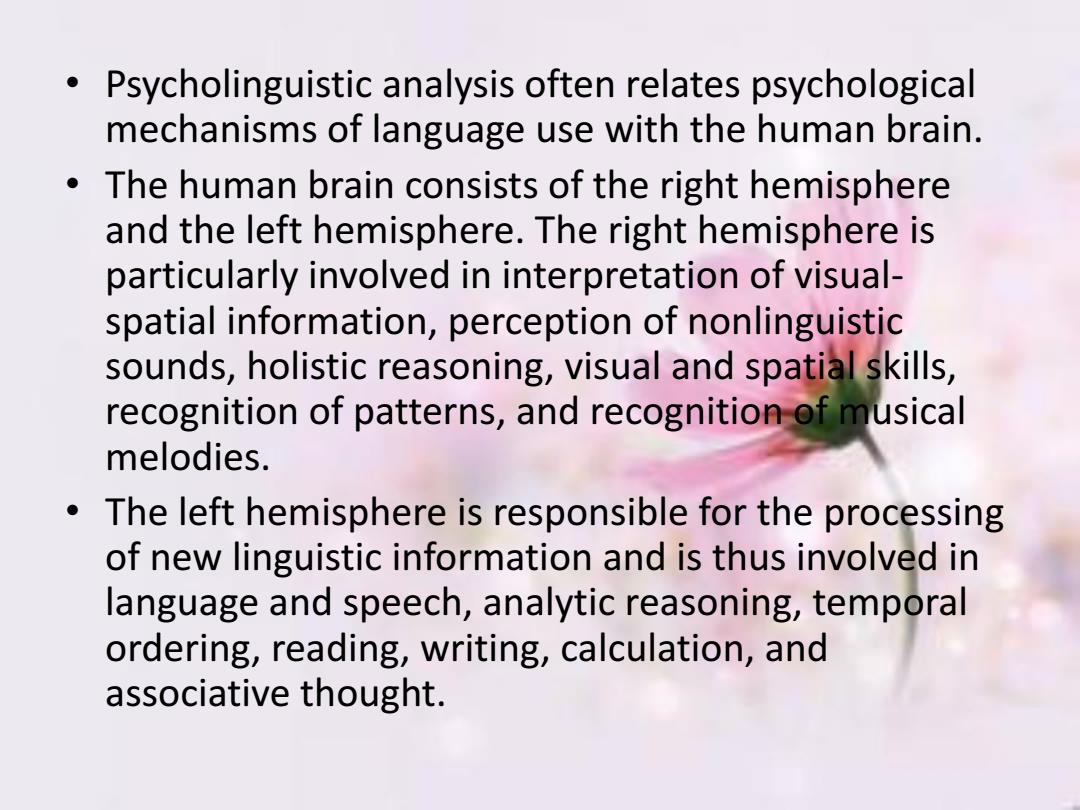
Psycholinguistic analysis often relates psychological mechanisms of language use with the human brain. The human brain consists of the right hemisphere and the left hemisphere.The right hemisphere is particularly involved in interpretation of visual- spatial information,perception of nonlinguistic sounds,holistic reasoning,visual and spatial skills, recognition of patterns,and recognition of musical melodies. The left hemisphere is responsible for the processing of new linguistic information and is thus involved in language and speech,analytic reasoning,temporal ordering,reading,writing,calculation,and associative thought
• Psycholinguistic analysis often relates psychological mechanisms of language use with the human brain. • The human brain consists of the right hemisphere and the left hemisphere. The right hemisphere is particularly involved in interpretation of visual- spatial information, perception of nonlinguistic sounds, holistic reasoning, visual and spatial skills, recognition of patterns, and recognition of musical melodies. • The left hemisphere is responsible for the processing of new linguistic information and is thus involved in language and speech, analytic reasoning, temporal ordering, reading, writing, calculation, and associative thought

Language is.... the Jewel in the Crown of Cognition We think only through the medium of words. Language is a constituent part in the thought. .One cannot think anything that lies outside the limits of language
Language is…. • the Jewel in the Crown of Cognition • We think only through the medium of words. Language is a constituent part in the thought. •One cannot think anything that lies outside the limits of language
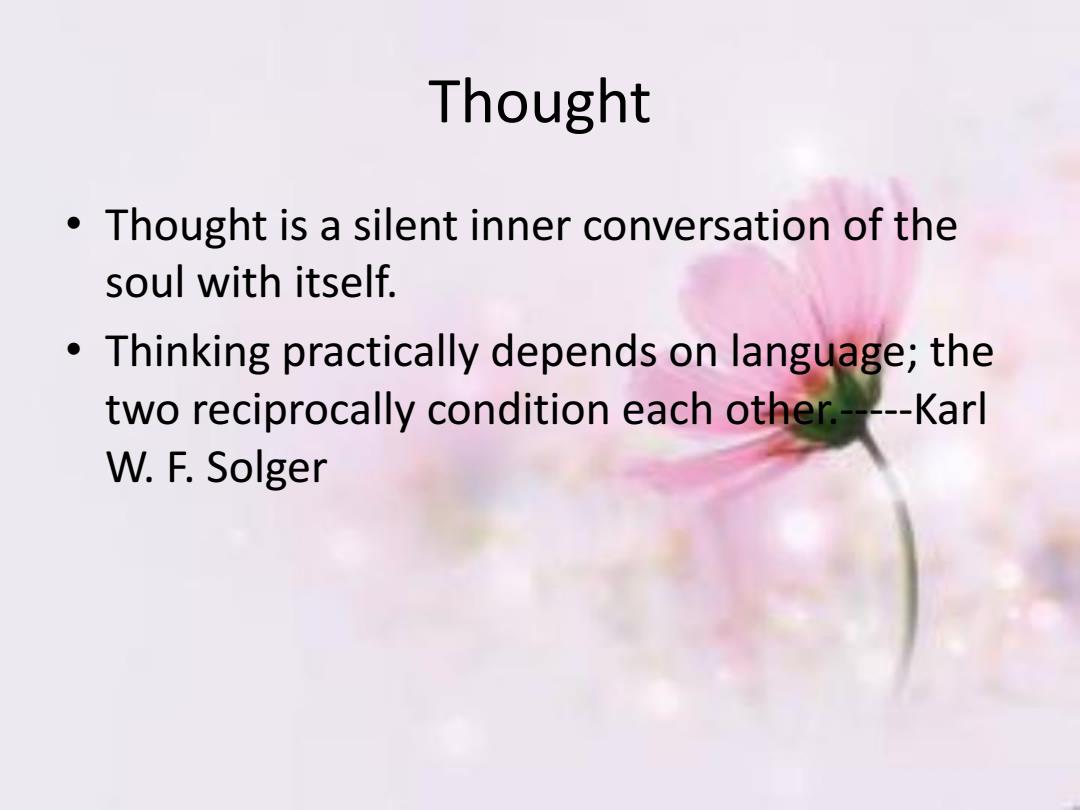
Thought Thought is a silent inner conversation of the soul with itself. Thinking practically depends on language;the two reciprocally condition each other.-----Karl W.F.Solger
Thought • Thought is a silent inner conversation of the soul with itself. • Thinking practically depends on language; the two reciprocally condition each other.-----Karl W. F. Solger
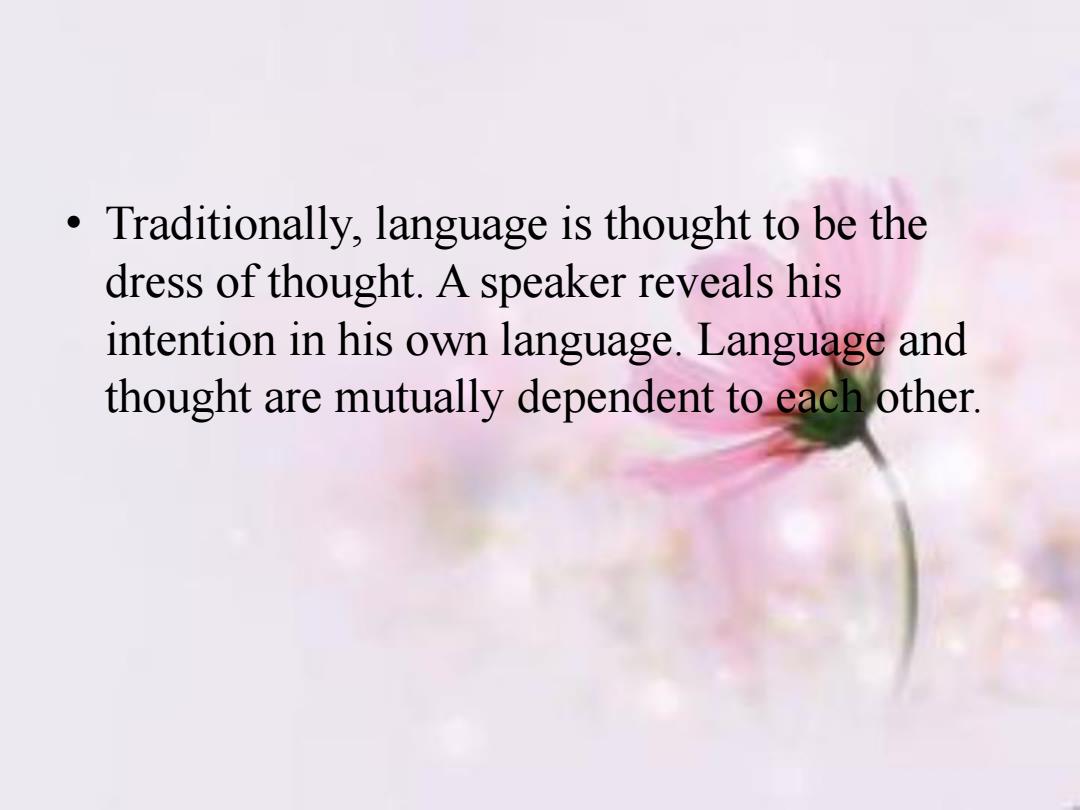
Traditionally,language is thought to be the dress of thought.A speaker reveals his intention in his own language.Language and thought are mutually dependent to each other
• Traditionally, language is thought to be the dress of thought. A speaker reveals his intention in his own language. Language and thought are mutually dependent to each other
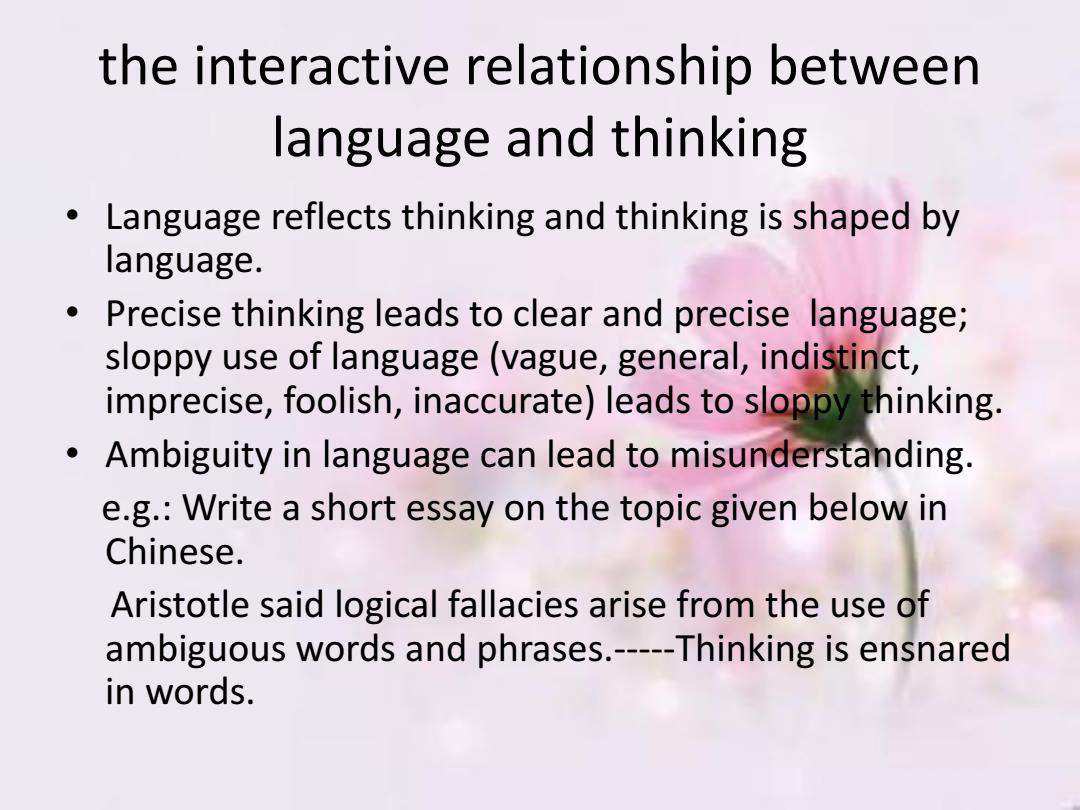
the interactive relationship between language and thinking Language reflects thinking and thinking is shaped by language. Precise thinking leads to clear and precise language; sloppy use of language (vague,general,indistinct, imprecise,foolish,inaccurate)leads to sloppy thinking. Ambiguity in language can lead to misunderstanding. e.g.:Write a short essay on the topic given below in Chinese. Aristotle said logical fallacies arise from the use of ambiguous words and phrases.-----Thinking is ensnared in words
the interactive relationship between language and thinking • Language reflects thinking and thinking is shaped by language. • Precise thinking leads to clear and precise language; sloppy use of language (vague, general, indistinct, imprecise, foolish, inaccurate) leads to sloppy thinking. • Ambiguity in language can lead to misunderstanding. e.g.: Write a short essay on the topic given below in Chinese. Aristotle said logical fallacies arise from the use of ambiguous words and phrases.-----Thinking is ensnared in words